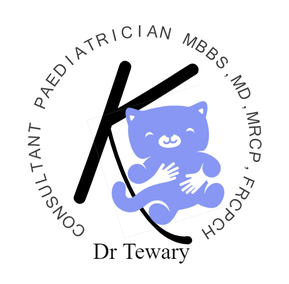Childhood Illnesses
Birmingham and the West Midlands
UTI Myths and Facts
DR Kishor Tewary, Consultant Paediatrician, special interest in renal paediatrics

Consultant Paediatrician Specialising in UTI’s in Birmingham
Is it a UTI or not?
Many of the referrals are based on the symptoms of dysuria along with positive urine culture/dipsticks which unfortunately can sometimes be due to a contaminated sample. For making a diagnosis of UTI, it is very important to make sure that patient is having specific symptoms too. NICE Guidance allows primary care to diagnose UTI on basis of dipsticks; however urine culture is still the gold standard for confirmation of UTI.
So, what are the symptoms of UTI?
The recent NICE guideline has outlined the most common to least common symptoms in the beginning of UTI algorithm. However this does not specify which symptom is more specific to urinary tract. Though dysuria may be the commonest symptom for UTI, it is more commonly produced by a local infection at vulvo-vaginal /prepuce area .Fever along with dysuria and/or other symptoms such as increased frequency, urgency, haematuria, secondary enuresis, pain abdomen and loin pain is strongly suggestive of UTI in a chid after the age of infancy. Absence of fever raises a suspicion on the diagnosis after infancy, however older children and adolescents can present just with symptoms of cystitis. The symptoms can be very non-specific in infancy period.
Where is the UTI?
It is very important to decide on the location of UTI if clinically suspected. An upper UTI involving Kidneys can damage the kidneys soon if not picked up very early. Mostly the symptom suggesting an upper UTI is loin pain in presence of other symptoms and fever. A child looking unwell with high fever and other symptoms suggesting UTI should always be suspected of having an upper UTI unless proven. Though NICE suggests upper UTI can be treated with oral antibiotics, it can be argued to treat them aggressively with initial parenteral antibiotic if child is unwell, especially within a secondary setting.
What type of UTI?
NICE suggest 3 types of UTIs-simple, atypical and recurrent. Simple UTI is a UTI which is a lower UTI (not involving kidneys), responds within 48 hours of starting treatment and
caused by E.coli. Simple UTIs usually do not need any investigations other than urine culture after the age of infancy.
It becomes atypical if child does not respond within 48 hours, is unwell, shows a non-E.coli organism in the urine culture, has got impaired kidney function or got abdominal mass. This may need further imaging of kidney tract.
